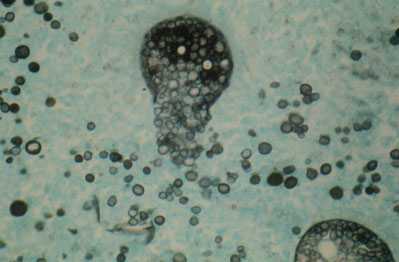1. A resistant body formed within the vegetative cells of some bacteria, particularly those belonging to the genera Bacillus and Clostridium. 2. A fungus spore borne within a cell or within the tubular end of a sporophore as in the spherule of Coccidioides immitis. [endo- + G. sporos, seed]
* * *
en·do·spore -.spō(ə)r, -.spȯ(ə)r n an asexual spore developed within the cell esp. in bacteria
* * *
n.
the resting stage of certain bacteria, particularly species of the genera Bacillus and Clostridium. In adverse conditions the bacterium can become enclosed within a tough protective coat, allowing the cell to survive. On return of favourable conditions the spore changes back to the vegetative form.
* * *
en·do·spore (enґdo-spor) [endo- + spore] 1. a thick-walled body formed within the vegetative cells of certain bacteria (e.g., Bacillus, Clostridium, Sarcina) that is able to withstand adverse environmental conditions for prolonged periods; under favorable conditions it will germinate to form a vegetative bacterium. See also spore. 2. an asexual fungal spore produced within the hyphae or cell, as in a spherule of Coccidioides immitis or in a sporangium.
 Endospore release by Coccidioides immitis spherule in tissue (methenamine silver stain).
Endospore release by Coccidioides immitis spherule in tissue (methenamine silver stain).
Medical dictionary. 2011.